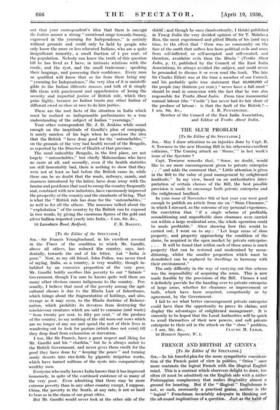[To the Editor of the SPECTATOR.]
SIR,—Sir Francis Younghusband, in his excellent account in the Times of the condition to which Mr. Gandhi, above all others, has reduced the country, says, inci- dentally, towards the end of his letter, . hat "India is poor." Now, as my old friend, John Pollen, was never tired of saying, India, as a country, is very wealthy, though in- habited by an excessive proportion of the very poor. Mr. Gandhi boldly ascribes this poverty to our " Satanic " Government, though I'm sure he knows quite well there are many other -obvious causes indigenous to the country. Per- sonally, I believe that most of the poverty among the agri- cultural classes is due to the Hindu Law of Inheritance, which brings about the fragmentation of holdings, and also, strange as it may seem, to the Hindu doctrine of Reincar- nation, which prohibits its devotees from destroying the mischievous creatures which are said to consume (and waste) "from twenty per cent. to fifty per cent." of the 'produce of the country, to say nothing of the old worn-out cows which are no longer of any use and spend the rest of their lives in wandering out to look for pasture (w- hich does not exist) till they drop dead from exhaustion or starvation.
I too, like Sir Francis, have a great respect and liking for Mr. Gandhi and his " charldia," but he is always unfair to the British Government, and never gives them Credit for the good they have done by " keeping the peace" and turning sandy deserts into rice-fields by gigantic irrigation• works, which have turned millions of the ryots into comparatively wealthy men.
Everyone who really knows India knows that it has improved immensely, in spite of the continued existence of so many of the very poor. Even admitting that there may be more extreme poverty than in any other country except, I suppose, China, the -poverty in the South, at any rate, is nOt so' hard to bear as in the slums of our great cities.
But Mr. Gandhi would never look at the other side of the shield ; and though he once (inadvertently, I think) published in Young India the very decided opinion of Sir T. Mahdava Rau, the most experienced and gifted Hindu of his (and my) time, to the effect that "there was no community on the face of the earth that suffers less from political evils and more from self-inflicted, or self-accepted and self-created, and therefore, avoidable evils than the Hindu" (Truths About India, p. 11, published by the Council of the East India Association), he always avoided the subject, and could never be persuaded to discuss it or even read the book. The late Sir Charles Elliott was at the time a member of our Council, and his probably quite true statement that 40,000,000, of the people (say thirteen per cent.) "never have a full meal " should be read in connexion with the fact that he was also responsible for Truths About India. From time inunemorial manual labour (the " Coolie ") has never had its fair share of the produce of labour : is that the fault of the British ?—
I am, Sir, &c., J. B. PENNINGTON. - Member of the Council of the East India Association, and Editor of Truths About India.










































 Previous page
Previous page